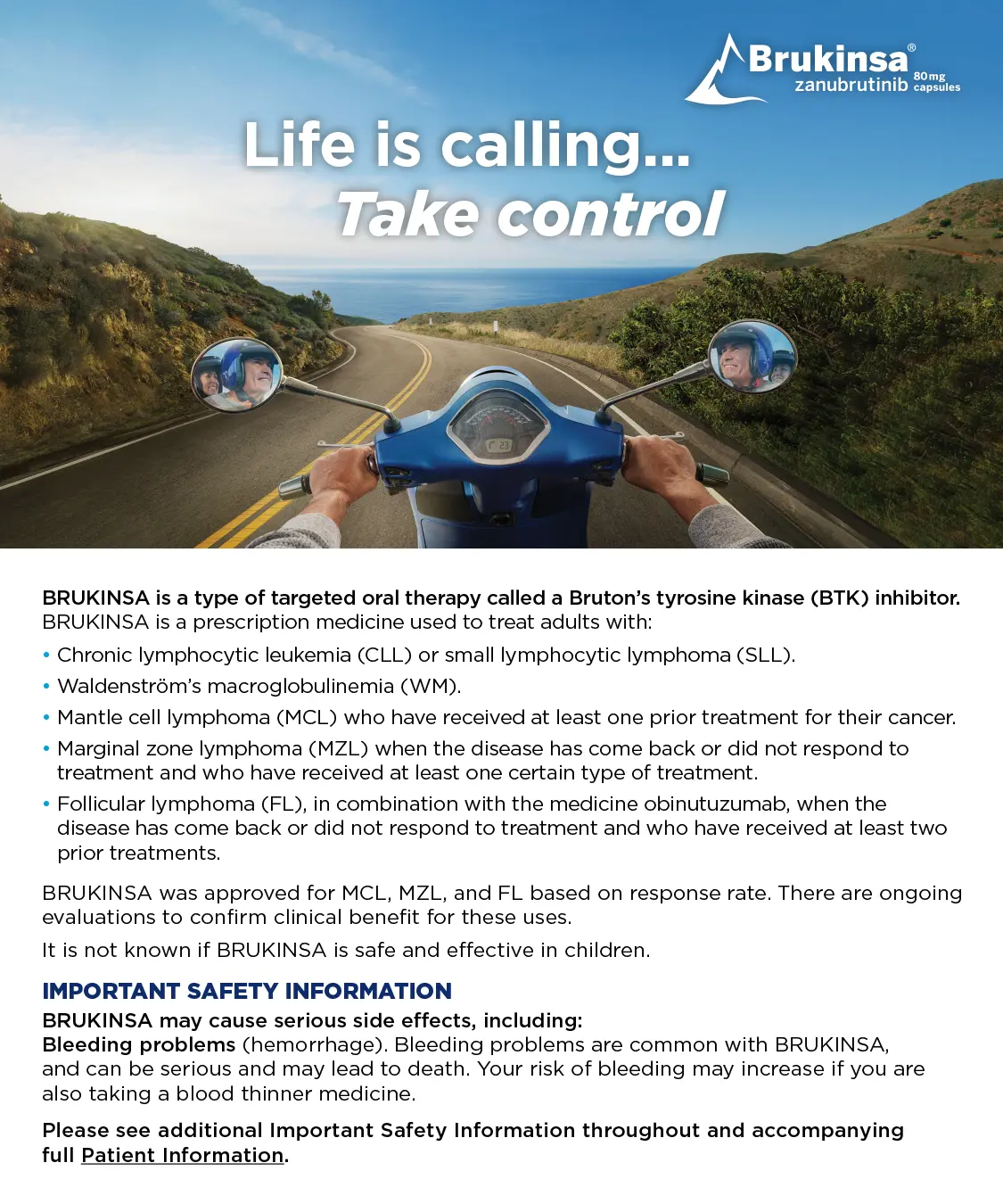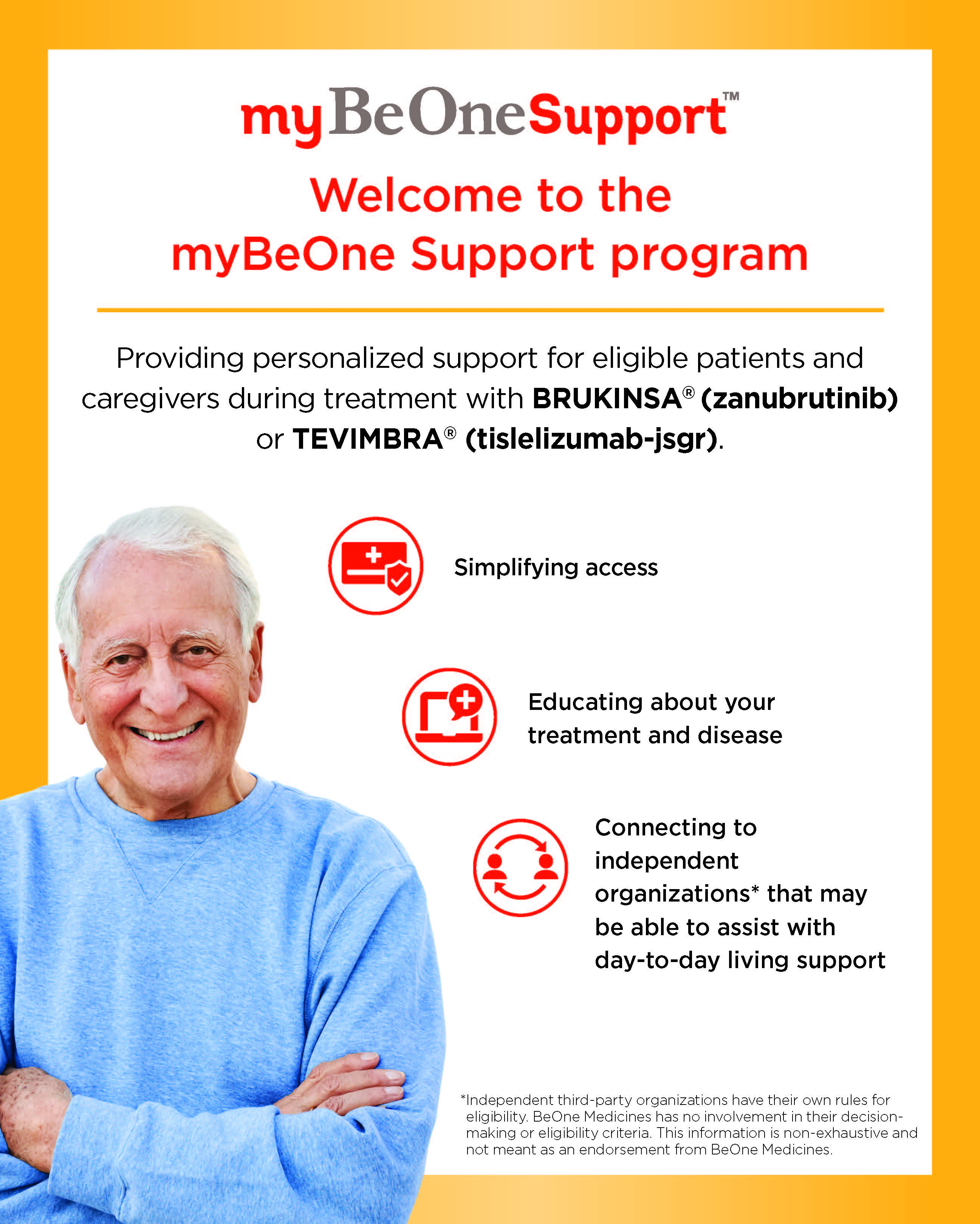Now Approved as Tablets: Available Early October 2025
Resources to help you take control of your
 Patient Assistance Program
Patient Assistance ProgramCall 1-833-234-4363 to talk with an Oncology Nurse Advocate. Oncology Nurse Advocates are available 8 AM-8 PM ET Monday through Friday.
Access, download, and print helpful tools for information about treatment and support with BRUKINSA.

BRUKINSA Patient Brochure
The BRUKINSA patient brochure will help answer questions you may have about treatment.

myBeOne Support Patient Brochure
The myBeOne Support patient brochure will provide an overview of the services available through the myBeOne Support patient assistance program.
Listed below are a variety of resources available to help you and your caregivers.
If you are seeking specific assistance or services, your dedicated myBeOne Support Oncology Nurse Advocate can help identify the organizations that may best fulfill your needs and connect you to them.
Leukemia & Lymphoma Society
www.lls.orgThe Leukemia & Lymphoma Society (LLS) is the world’s largest voluntary health agency dedicated to blood cancer. The LLS mission: Cure leukemia, lymphoma, Hodgkin’s disease, and myeloma, and improve the quality of life of patients and their families. LLS funds lifesaving blood cancer research around the world and provides free information and support services.
Lymphoma Research Foundation
www.lymphoma.orgThe Lymphoma Research Foundation (LRF) is the nation’s largest lymphoma-focused health organization devoted to improving care through education and support services and improving outcomes through investment in the most promising lymphoma research.
Cancer Support Community
www.cancersupportcommunity.orgAs the largest professionally led nonprofit network of cancer support worldwide, the Cancer Support Community (CSC) is dedicated to ensuring that all people impacted by cancer are empowered by knowledge, strengthened by action, and sustained by community. The CSC also conducts cutting-edge research on the emotional, psychological, and financial journey of cancer patients.
National Comprehensive Cancer Network
www.nccn.orgThe National Comprehensive Cancer Network® (NCCN®) is a not-for-profit alliance of 33 leading cancer centers devoted to patient care, research, and education. NCCN is dedicated to improving and facilitating quality, effective, efficient, and accessible cancer care so patients can live better lives.
CancerCare
www.cancercare.org/caregivingFounded in 1944, CancerCare is the leading national organization providing free, professional support services and information to help people manage the emotional, practical, and financial challenges of cancer.
Caregiver Action Network
www.caregiveraction.orgCaregiver Action Network (CAN) works to improve the quality of life for Americans who care for loved ones with chronic conditions, disabilities, disease, or the frailties of old age. CAN provides education, peer support, and resources to family caregivers across the country, free of charge.
American Cancer Society
www.cancer.orgThe American Cancer Society is a nationwide, community-based, voluntary health organization dedicated to eliminating cancer as a major health problem.
IMPORTANT SAFETY INFORMATION
What should I tell my healthcare provider before taking BRUKINSA?
Before taking BRUKINSA, tell your healthcare provider about all of your medical conditions, including if you:
- have bleeding problems.
- have had recent surgery or plan to have surgery. Your healthcare provider may stop BRUKINSA for any planned medical, surgical, or dental procedure.
- have an infection.
- have or had heart rhythm problems.
- have high blood pressure.
- have liver problems, including a history of hepatitis B virus (HBV) infection.
- are pregnant or plan to become pregnant. BRUKINSA can harm your unborn baby. If you are able to become pregnant, your healthcare provider may do a pregnancy test before starting treatment with BRUKINSA.
- Females should avoid getting pregnant during treatment and for 1 week after the last dose of BRUKINSA. You should use effective birth control (contraception) during treatment and for 1 week after the last dose of BRUKINSA.
- Males should avoid getting female partners pregnant during treatment and for 1 week after the last dose of BRUKINSA. You should use effective birth control (contraception) during treatment and for 1 week after the last dose of BRUKINSA.
- are breastfeeding or plan to breastfeed. It is not known if BRUKINSA passes into your breast milk. Do not breastfeed during treatment with BRUKINSA and for 2 weeks after the last dose of BRUKINSA.
Tell your healthcare provider about all the medicines you take, including prescription and over-the-counter medicines, vitamins, and herbal supplements. Taking BRUKINSA with certain other medications may affect how BRUKINSA works and can cause side effects.
What are the possible side effects of BRUKINSA?
BRUKINSA may cause serious side effects, including:
- Bleeding problems (hemorrhage). Bleeding problems are common with BRUKINSA, and can be serious and may lead to death. Your risk of bleeding may increase if you are also taking a blood thinner medicine. Tell your healthcare provider if you have any signs or symptoms of bleeding, including:
- blood in your stools or black stools (looks like tar)
- pink or brown urine
- unexpected bleeding, or bleeding that is severe or you cannot control
- vomit blood or vomit that looks like coffee grounds
- cough up blood or blood clots
- increased bruising
- dizziness
- weakness
- confusion
- change in speech
- headache that lasts a long time
- Infections that can be serious and may lead to death. Tell your healthcare provider right away if you have fever, chills, or flu-like symptoms.
- Decrease in blood cell counts (white blood cells, platelets, and red blood cells). Your healthcare provider should do blood tests during treatment with BRUKINSA to check your blood counts.
- Second primary cancers. New cancers have happened in people during treatment with BRUKINSA, including cancers of the skin or other organs. Your healthcare provider will check you for other cancers during treatment with BRUKINSA. Use sun protection when you are outside in sunlight.
- Heart rhythm problems (atrial fibrillation, atrial flutter, and ventricular arrhythmias) that can be serious and may lead to death. Tell your healthcare provider if you have any of the following signs or symptoms:
- your heartbeat is fast or irregular
- feel lightheaded or dizzy
- pass out (faint)
- shortness of breath
- chest discomfort
- Liver problems. Liver problems, which may be severe or life-threatening, or lead to death, can happen in people treated with BRUKINSA. Your healthcare provider will do blood tests to check your liver before and during treatment with BRUKINSA. Tell your healthcare provider or get medical help right away if you have any signs of liver problems, including stomach pain or discomfort, dark-colored urine, or yellow skin and eyes.
The most common side effects of BRUKINSA include:
- decreased white blood cell count
- decreased platelet count
- upper respiratory tract infection
- bleeding
- muscle, bone, or joint pain
These are not all the possible side effects of BRUKINSA. Call your doctor for medical advice about side effects. You may report side effects to FDA at 1-800-FDA-1088.
What is BRUKINSA?
BRUKINSA is a prescription medicine used to treat adults with:
- Chronic lymphocytic leukemia (CLL) or small lymphocytic lymphoma (SLL).
- Waldenström’s macroglobulinemia (WM).
- Mantle cell lymphoma (MCL) who have received at least one prior treatment for their cancer.
- Marginal zone lymphoma (MZL) when the disease has come back or did not respond to treatment and who have received at least one certain type of treatment.
- Follicular lymphoma (FL), in combination with the medicine obinutuzumab, when the disease has come back or did not respond to treatment and who have received at least two prior treatments.
It is not known if BRUKINSA is safe and effective in children.
Please see full Prescribing Information including Patient Information.

